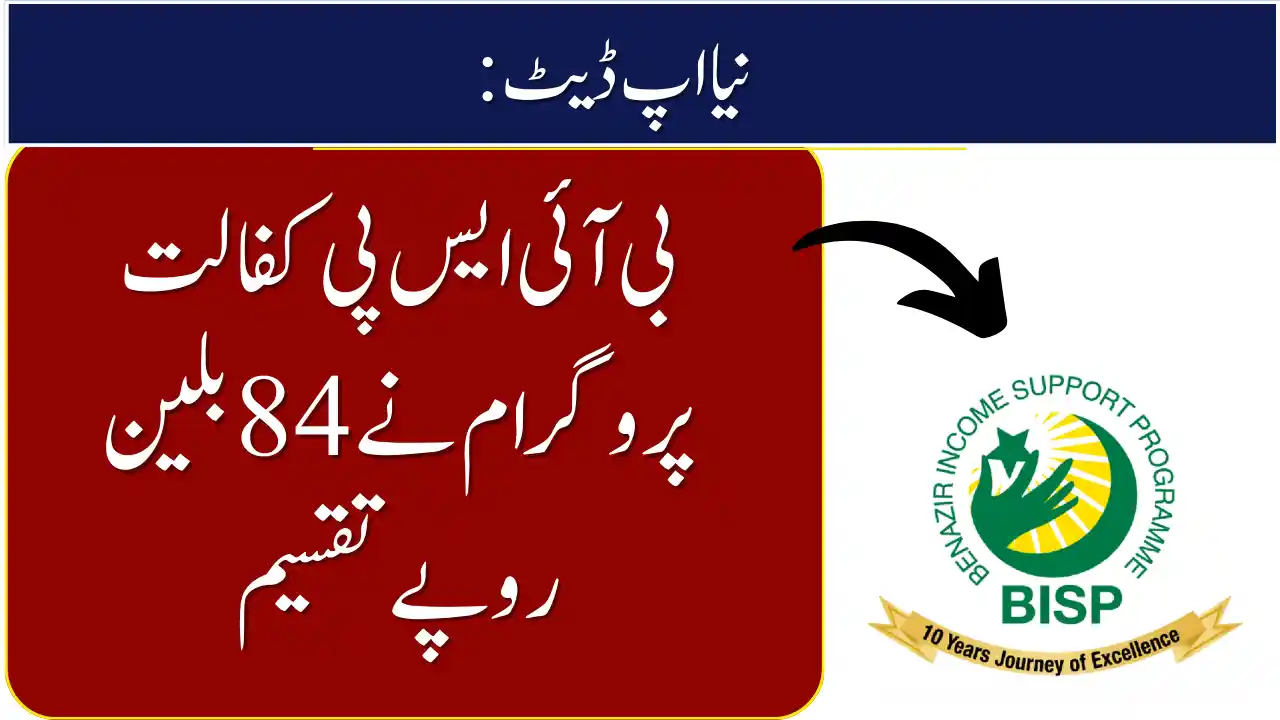BISP Kafalat Program Distributed 84 Billion Rupees
The Benazir Income Support Program (BISP) is a vital social safety net initiative established by the Government of Pakistan. It aims to provide essential financial aid to low-income families, with a particular focus on empowering women. Recently, the BISP Kafalat Program, a significant component of BISP, has been in the spotlight for distributing an impressive sum of 84 billion rupees. This distribution, carried out in three phases, is designed to support millions of women across the country, enhancing their economic stability and improving their quality of life.
Phases of Distribution
Phase 1: Identification and Registration
The initial phase of the distribution process involved identifying and registering eligible beneficiaries. This was achieved using the National Socio-Economic Registry (NSER) to ensure that assistance reached the most deserving families. Field surveys and digital data collection methods were utilized to gather accurate and comprehensive information about potential beneficiaries.
Phase 2: Verification and Enrollment
In the second phase, the collected data underwent a rigorous verification process. This included cross-checking with other government databases to confirm the accuracy of the information. Verified beneficiaries were then enrolled in the Kafalat Program and provided with banking details to facilitate smooth financial transactions.
Phase 3: Disbursement of Funds
The final phase focused on the disbursement of funds. To ensure prompt and secure delivery, the funds were distributed through various channels, including branchless banking and ATM cards. The use of digital technology and real-time monitoring played a crucial role in enhancing transparency and efficiency during this phase.
Impact of the Program
The distribution of 84 billion rupees has had a profound impact on the lives of millions of women and their families. Key impacts include:
- Economic Empowerment: The financial assistance has enabled women to manage their finances more effectively, invest in small businesses, and contribute to household incomes.
- Improved Living Standards: The funds have helped families cover essential needs such as food, clothing, and healthcare, leading to better living conditions.
- Social Inclusion: By targeting the most vulnerable groups, the program has promoted social inclusion and worked to reduce inequality.
- Education and Health: With greater financial stability, families have been able to invest in their children’s education and healthcare, setting the stage for improved future prospects.
Frequently Asked Questions (FAQs)
What is the BISP Kafalat Program?
The BISP Kafalat Program is a financial assistance initiative aimed at providing regular income support to low-income families, with a special emphasis on women. Its goal is to help beneficiaries meet basic needs and enhance their living standards.
How are beneficiaries selected for the Kafalat Program?
Beneficiaries are selected through a thorough process involving data collection from the National Socio-Economic Registry (NSER), field surveys, and verification with other government databases. This comprehensive approach ensures that aid reaches those most in need.
How is the financial assistance disbursed to beneficiaries?
Financial assistance is disbursed through various channels, including branchless banking and ATM cards, to ensure secure and efficient delivery of funds to beneficiaries.
What are the key benefits of the Kafalat Program?
The Kafalat Program provides several benefits, including economic empowerment of women, improved living standards, promotion of social inclusion, and enhanced access to education and healthcare for beneficiaries’ families.
What challenges has the Kafalat Program faced, and how have they been addressed?
Challenges include ensuring data accuracy, reaching remote areas for fund disbursement, and educating beneficiaries about the program. These issues have been addressed through ongoing data verification, the use of digital and mobile banking solutions, and community outreach efforts.
Distribution Phases Explained
Phase One: Initial Distribution
During the first phase, BISP Kafalat provided immediate financial support to millions of registered beneficiaries. This phase was crucial for establishing a reliable system to deliver assistance efficiently to those in need.
Phase Two: Expanding Reach
The second phase focused on broadening the program’s reach, adding more families to the beneficiary list. This phase also introduced measures to ensure transparency and accountability, including informing beneficiaries about receiving the full amount without deductions.
Phase Three: Enhanced Benefits
In the third phase, BISP expanded the range of benefits, including an additional Rs 4,500 for each child enrolled in school under the Taleemi Wazaif initiative. This measure aimed to support educational expenses and promote long-term growth by investing in children’s education.
Guidance for BISP Beneficiaries
The BISP team has issued guidelines to help beneficiaries receive their payments without issues. Recipients are advised to check their funds upon receipt and request a receipt to protect against fraud or unauthorized deductions. Transparency in the distribution process remains a top priority.
Enrollment and New Payments
BISP opened the registration process for new beneficiaries in August, with payments expected to begin in September. Families are encouraged to complete their surveys and update their information to be eligible for future payments. The registration process is designed to be user-friendly to ensure that all eligible families can participate.
Conclusion
The Benazir Income Support Program’s recent distribution of 84 billion rupees marks a significant achievement in providing financial assistance to millions of Pakistani families. By focusing on transparency and efficiency, BISP has made substantial progress in alleviating economic pressures and promoting education among low-income families. As the program continues to evolve, it remains a critical support system for those in need, offering hope for a better future.
Quick Details Table
| Date | Event | Amount |
| July 31, 2024 | Distribution of 84 billion rupees | Rs. 84 billion |
| August 2024 | New beneficiary registration opens | – |
| September 2024 | Payments to new beneficiaries begin | – |
For more information on the BISP Kafalat Program and to apply or check your status, visit the official BISP website or contact your local BISP office.


